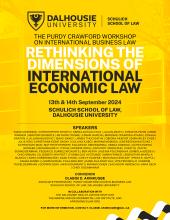Call for Papers: Workshop for Early Career Scholars to Prepare a Manuscript Submission to the Journal of World Investment and Trade (JWIT)
Embarking on an academic career is both exciting and challenging, particularly for legal researchers in the early stages; however, navigating the complexities of academic publishing can be daunting. This workshop is tailored to support early career scholars by providing a comprehensive overview of the publication process in JWIT. Participants will gain valuable insights into crafting a scientifically rigorous article with guidance on every phase from the initial draft to the final peer review.
